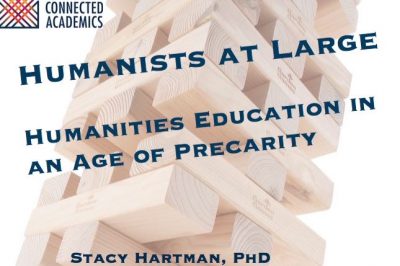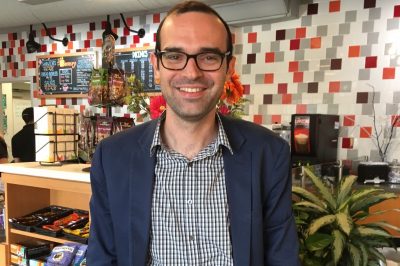William Stark, a Ph.D. candidate in the Spanish Studies section, has come a long way from his native Colorado to pursue research in contemporary Chicano and Latino performance art and cultural production. The fourth year student is writing his dissertation on transcultural performance by Latino and Chicano performance artists in the United States and Mexico. These include Guillermo Gómez-Peña, Coco Fusco, Violeta Luna, Roberto Sifuentes, and the performance-collaborative La Pocha Nostra. Stark’s research explores how their aesthetic projects critique hegemonic discourses in the US.
Winner of the Outstanding Scholar Award from faculty in the Spanish program last spring, and recipient of an LCL Summer Pre-Doctoral Scholarship, William used his awards to interview Guillermo Gómez-Peña, Balitronica (aka the “Phantom Mariachi”), and Emma Tramposch in San Francisco. While there he had the opportunity to attend a gala hosted by RADAR Productions, a non-profit that produces literary happenings in the Bay area, and provides a platform for queer and outsider writers and artists whose work reflects the diverse experiences of the LBGTQA community. He later flew to Santa Fe, New Mexico, where he had the opportunity to participate in one of La Pocha Nostra’s legendary radical performance pedagogy workshops.
Stark’s dream has not always revolved around an academic career. He has been interested in painting and writing and music and is also passionate about cooking. From a young age he worked in restaurants and eventually became a professional cook. Later, he became a chef in Seattle, during the period, in the 1980s, when the city was becoming the culinary capital of Washington State. He would go on to cook professionally in Ireland and Ecuador. It was during his time in Ecuador that he learned to speak Spanish. The ex-French major explored a lot of South America, traveling all the way from Ecuador to Tierra del Fuego and back, mostly by just walking and hitchhiking! When I asked him if he misses his days as a chef he admitted that it was an exciting profession, but an exhausting one. He feels his academic career brings him deeper gratification and is less stressful. One of the main challenges he has found in academia is staying focused since he tends to express his ideas through painting and music at the same time. UConn has helped him to learn how to channel his energies and thus to gain a more profound understanding of his topics. He enjoys the diversity of the faculty’s interests as well as the fact that everybody in the department is very research-oriented and academically curious.
Besides working on his teaching and dissertation, Stark is involved in numerous collaborations. He was one of the cofounders of The Quiet Corner Interdisciplinary Journal, and now serves as the Editor for La Ojuela Research Project, a group that produces and disseminates knowledge about the history of the Compañía Minera de Peñoles’ silver lead mine, La Ojuela, in Durango. William feels personally connected to this project, as his paternal great-grandfather, Hugh Callory Watson, was a superintendent at the mine at the beginning of the Mexican Revolution.
Stark has already started working on his résumé and to apply for jobs and is looking forward to seeing what the future holds for him. His ideal job, he says, would be a small Liberal Arts college where he can teach and have time to work on his research. He intends to focus on Chicano and Latino cultural production/performance and its intersection with indigenous performance.

